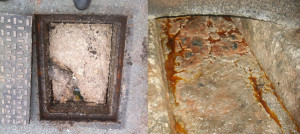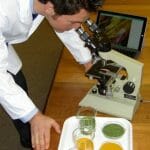You may need the paying public, but you don’t need the stuff they persist in putting down your drains, loos and sinks. Contrary to popular belief, far from being a convenient place to get rid of everything bar the kitchen sink, our wastewater network only functions if it’s not blocked with the detritus of modern day living. Drain blockages cause sewage spills, emergency repair costs, pollution incidents, health concerns and business disruption. Ultimately that impacts on your reputation — and your bottom line.
According to Water UK, around 80% of the annual 360,000 sewer blockages in the UK are the result of fat, oil and grease (‘FOG’, as it’s known in drainage circles), wipes, sanitary waste and other unflushable items being disposed of into the network. It costs water companies a staggering £88 million a year — more for post-flood clean ups.
Drainage specialist UKDN Waterflow, has put together the ‘dirty dozen’ of blocked drains:
- Any wet wipes
- Nappies and pads
- Tampons and wrappers
- Sanitary products
- Fats, oils and grease
- Dental floss
- Cotton buds
- Hair
- Bandages and plasters
- Condoms
- Medicines and syringes
- Razor blades
UKDN Waterflow engineers recover these — and many other, more bizarre items — from drains every single day. So, rather than just keep on clearing the blockages, the wastewater industry is ramping up efforts to help customers take preventative action.
Education, education, education
The public needs to be reminded what they can and can’t put in the drains. Displaying posters in washrooms, toilets and kitchens, asking people not to dispose of the items down sinks and toilets, but to bin them instead, is a simple step. It may be obvious, but it works — even better, ready-made posters are available for you to download (www.ukdnwaterflow.co.uk).
The public are not the only ones using your facilities, so include awareness training and reminders for your employees too, especially for kitchen staff dealing with FOG.
Even liquid fat congeals into hard, impenetrable matter once it’s in the pipes. Worse, as it accumulates, it collects other sanitary waste (wipes and so on which shouldn’t be there either) and before you know it, you have a fatberg on your hands. The figures are damning: according to the Guardian, 90% of restaurants are responsible for the fatbergs choking the London sewer system. (https://www.theguardian.com/environment/2017/oct/11/fatbergs-london-restaurants-oil-food-grease-traps).
We need to do our bit
 It’s time we tackled the problem collectively, if we are not to see the drainage infrastructure come to a grinding halt. There are legal consequences too: you could face heavy fines if you don’t take steps to stop fats and other polluting substances getting into the wastewater network.
It’s time we tackled the problem collectively, if we are not to see the drainage infrastructure come to a grinding halt. There are legal consequences too: you could face heavy fines if you don’t take steps to stop fats and other polluting substances getting into the wastewater network.
UKDN Waterflow director Andy Jackson said: “Besides educating staff and the public about drainage etiquette, good housekeeping makes common sense. If you are building new or extending existing premises, including good access to wastewater pipes at design stage allows maintenance to be done with minimal fuss.
“On large sites, look at planned maintenance programmes to get grease traps and interceptors cleaned and emptied and drains surveyed and cleaned at regular intervals, for example. Keeping drains clear also helps to lessen flood risk during sustained wet weather.
“Act responsibly and your drains will be an asset, not a liability!”
For further advice about drainage best practice, contact UKDN Waterflow (LG) on 0333 344 2937 or visit www.ukdnwaterflow.co.uk.



